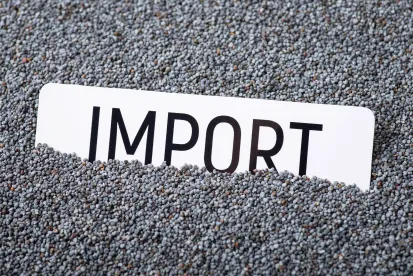Section 1758 classification of Automated Peptide Synthesis Instruments would restrict both U.S. exports and foreign investments
Section 1758 of the Export Control Reform Act (“ECRA”) not only governs export restrictions but also materially influences whether a U.S. business with Section 1758 capabilities is subject to limits in foreign direct investment.
The U.S. Department of Commerce, Bureau of Industry and Security (BIS), maintains controls on the export, reexport and transfer of dual-use items and less sensitive military items pursuant to the Export Administration Regulations (EAR). BIS has recently proposed classifying certain automated peptide synthesis instruments under Section 1758.
Section 1758 authorizes BIS to establish export controls for emerging and foundational technologies essential to the national security of the United States. ECRA does not differentiate between “emerging technology” and “foundational technology,” nor does it provide specific definitions or guidance. As a result, BIS collectively characterizes such technologies as “Section 1758 Technologies.”
Overlap Between U.S Export Controls and CFIUS
Historically, businesses involved in the U.S. defense industrial base have been protected from foreign direct investment by the Committee on Foreign Investment in the U.S. (CFIUS) — but changes to U.S. laws and regulations on foreign direct investment have expanded the types of businesses that are now protected.
In particular, the Foreign Investment Risk Review Modernization Act of 2018 (FIRRMA) was intended to modernize CFIUS to address national security concerns arising from non-controlling investments by foreign persons in U.S. businesses that produce, design, test, manufacture, fabricate, or develop “critical technologies.” “Critical technologies” was ultimately defined to include “emerging and foundational technologies” as controlled by ECRA Section 1758 – thereby resulting in a dual impact of any classification of a product, information, or other technology under Section 1758 as subject to both U.S. export control restrictions and CFIUS foreign direct investment review.
Expanded Scope of Review
Executive Order 14083 (September 15, 2022) specifically requires CFIUS to consider the effect of a proposed transaction on U.S. technological leadership / national security in biomanufacturing technologies – such as the automated peptide synthesis instruments being addressed by BIS.
As a result, BIS’s proposed classification of certain automated peptide synthesis instruments as Section 1758 technologies and Executive Order 14083 compels an assessment of (i) the development of similar technologies in foreign countries, (ii) the development of such technologies in the U.S., and (iii) the proliferation of said technologies in foreign countries.
Proposed Export Control Changes
As background, most protein toxins on the Commerce Control List (CCL) that are controlled under ECCN 1C351 are over 100 amino acids in length and have an average length of 300 amino acids, with the notable exception of conotoxins which range between 10-100 amino acids in length.
On September 13, 2022, BIS published a “Request for Comments Concerning the Imposition of Section 1758 Technology Export Controls on Instruments for the Automated Chemical Synthesis of Peptides” [see RIN 0694-AI84]. In doing so, BIS indicated that current synthesis instruments can produce enough peptide toxin to cause mortality, but also acknowledged the usefulness of such instruments for therapeutic development. BIS also highlighted that the instruments can be for more dangerous purposes, such bio-weapons programs, necessitating additional export controls – though it committed to work with international partners to create multilateral controls to balance the benefits / risks between therapeutic and weapons research.
BIS proposes changes to ECCN 2B352 that would create a new item paragraph “.k,” which will contain three subparagraphs to control peptide synthesizers that are: partly or entirely automated (.k.1), capable of generating continuous peptide sequences greater than 75 amino acids (.k.2), and capable of producing 100 mg of peptide at 75% or greater purity in a single run (.k.3). The stated reasons for control, namely the proliferation of chemical and biological weapons (CB column 2) and anti-terrorism (AT column 1), would continue to apply to the entire ECCN.
Further, the proposed rule, if adopted, would mean that certain items currently eligible for export, reexport or transfer (in-country) to most destinations under the No License Required (NLR) designation would require an EAR authorization (i.e., in accordance with the terms and conditions of an EAR license exception or a license issued by BIS). BIS also anticipates that the proposed controls would result in ‘deemed’ export license applications (for the release of “technology” to foreign nationals located within the U.S.) to allow access to this “technology” by foreign students and faculty at U.S. universities, as well as by non-U.S. employees of U.S. firms. Finally, adding these items to the CCL under ECCN 2B352 may also change the export clearance requirements under the U.S. Census Bureau’s Foreign Trade Regulations (FTR).
Dual Impact on U.S. Export Controls and Foreign Direct Investment
The BIS’s stated objective for controlling automated peptide synthesis instruments under Section 1758 is to control emerging and foundational technologies essential to U.S. national security. Based on this stated objective, as well as FIRRMA’s application to “Section 1758 technologies,” automated peptide synthesis instruments and related information should be considered “critical technology” under CFIUS for purpose of foreign direct investment reviews.
As background, CFIUS was historically limited to technologies, industries and infrastructure directly involving national security. It was also a voluntary filing. FIRRMA expanded CFIUS to cover U.S. businesses involved with critical technologies, critical infrastructure, or sensitive personal data — referred to as “Technology, Infrastructure and Data” or simply “TID.”
FIRRMA requires that a U.S. business engaged in emerging technologies, now Section 1758 Technologies, such as the automated peptide synthesis instruments being addressed by BIS, be analyzed to determine whether a particular transaction will trigger a CFIUS declaration. More specifically, FIRRMA Part 801 triggers CFIUS based U.S. export licenses required to export, reexport, and transfer of critical technologies produced, designed, tested, manufactured, fabricated, or developed in the U.S. As a result, diligence is an integral part of any transaction involving Section 1758 technologies.
FIRRMA also established the analysis required to determine if an investor is a “foreign investor,” with Section 800.401(c)(1) specifically providing:
- Foreign control transaction investors are those that can directly control the covered U.S. business, or a change in rights foreign investors where such change can result in a control transaction or a covered investment.
- Foreign covered investment investors are those that directly acquire an equity interest in the covered U.S. business and that obtain access to any “material nonpublic technical information;” membership, participation, or nomination rights to the board of directors or equivalent governing body; and/or “involvement” or participation in “substantive decision making” regarding the use, development, manufacture, supply, acquisition, storage or release of TID.
Early Diligence and Assessment of Export Controls and Foreign Direct Investment
As a result, any development, distribution, or other transaction involving automated peptide synthesis instruments, should carefully assess both the proposed export control requirements as well as limits of foreign direct investment under U.S. CFIUS/FIRRMA.
More specifically, businesses and their counsel should exercise early diligence for exports, deemed exports, investments, financing, acquisitions, or joint venture opportunities to determine:
- Critical or export-controlled technologies?
- Existence of non-U.S. investors?
In closing, it should be noted that the U.S. is not alone. The United Kingdom and the European Union both have legislative frameworks governing the export of and investment in certain controlled technologies. Indeed, the UK regime extends to both domestic and foreign investments in certain controlled technologies. Both the UK and EU regimes, in common with the U.S. regulations, have the intent of managing risks to national security. Many other industrialized countries, such as Australia, China and Japan, have similar regimes.
Womble’s transatlantic attorneys have experience assisting U.S., UK, and other international businesses with cross border transactions. Our attorneys can help safeguard transactions involving export controls and foreign direct investment in a variety of jurisdictions around the globe, including early diligence to identify required licenses, registrations, disclosures, and filings. We can also assist with the creation of special purpose entities to mitigate foreign ownership, control and influence (FOCI) of businesses, technology, and real estate.
Additional information on the proposed BIS rule is in the Federal Register notice, and additional information on U.S. CFIUS / FIRRMA is located on the Treasury’s website.






 />i
/>i

